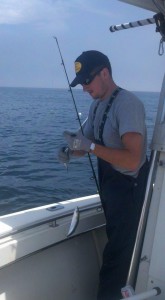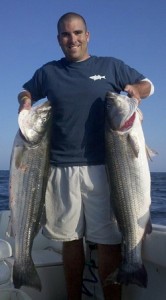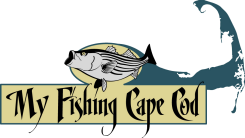I hope you're having an awesome Fourth of July week. Be careful out on the water and down at the boat ramp this week. Things can get a little nutty around the Holidays. Stay safe!
The heat is here and with it typically comes a shift in striped bass behavior in Cape Cod Bay. Summer is definitely here, which means you may be able to catch more bass by adjusting your techniques accordingly.
The areas that normally hold bass during the spring don't always produce come July. Areas that were devoid of any marine life often turn on once July 4th rolls around. Of course it's pretty much impossible to predict exactly what's going to happen this summer, but odds are the bass (or at least some of them!) will enter into the same "summer time mode" that we see each summer season on the Bay.
So far this season the Bay has fished pretty well for me, and for many of the folks I've been in touch with. I think Cape Cod in general has fished very well this season, and I'm pretty eager to see what the fish have in store for us over the next few weeks.
So how can you cash in on some of the larger stripers that are roaming around Cape Cod Bay at this very moment?
Well there's no right or wrong way to go about it, but if I was heading out today or tomorrow here is what I would do:

Live bait
90% of the fish we have caught on the Bay this year have been taken on live mackerel. Just because it's now July, doesn't mean that live macks won't produce. Actually, having a live well full of mackerel may be the best thing you can do to assure yourself of a decent trip.
There are still plenty of mackerel in the Bay, but they are becoming more scarce as the days pass by. Perhaps the macks will surprise us and infiltrate the entire Bay again, but if things go like normal they will continue to filter north and out of the reach of our sabiki rigs.
To find the macks you first must find an area of the Bay that contains food for the macks. This could be small herring, baby butterfish or a host of other small prey items. For the most part I've found these small bait fish in the past in water deeper than 50 feet. So if you're looking for macks this week, I think the 50 foot contour would be a good place to start.
Different sections of the Bay seem to be producing more mackerel than other sections at the moment. I haven't found mackerel in the eastern side of the Bay for a few weeks now - which doesn't mean they aren't there - I just haven't found them.
The western side of the Bay has been a different story. We found plenty of macks in a few locales to the west this past weekend, and from what I heard yesterday they are still there.
Live eels generally seem to work better towards the end of the summer, but it's never a bad idea to have a few on-board. I'm yet to get a take on an eel this year in the Bay, and I have placed a few right in the middle of some decent schools. For whatever reason the live macks (or fresh dead macks) have been the best bait as of late.
Artificials
The almighty tube and worm started working for us about one week ago today. I know of some nice fish that were taken this past week in the Bay on the tube.
July is usually a very good month for tube and worm trolling. Love it or hate it, dragging tubes catches bass, especially during hot and sticky summer afternoons. Few techniques I know of work better on lazy bass holding tight to the bottom or suspended in the water column than a 24 inch red tube.

Bunker spoons also work well during the first part of July. You may spend all day dragging them around for just one or two bass, but odds are the bass you catch are going to be quite hefty.
I remember a summer a few years ago when we were doing well on 20-30 pound fish using eels in the Bay and then, without warning, the fish seemed to have disappeared. Out went the bunker spoons and 30 minutes later we had a 35 and 41 pound striper on the deck - go figure!
Jigging works well and is a favorite of the Billingsgate and Race Point crowd, but it's just too much work for yours truly. No doubt there are certain situations when jigging with wire will catch more fish than any other technique, so if you already have wire setups ready for bunker spoons it might be a good idea to bring along a jigging rod and some bucktails.
Areas to find the cows
During this part of July I usually start finding bass in deeper areas than I did during the spring. A lot of the near shore hot spots in 20 feet or less of water seem to dry up a bit once July 4th rolls around.
Keep in mind that a lot of the butterfish, herring, mackerel and squid will be kicking around out deep in 50-70 feet of water. Finding the biomass out in these areas can seem overwhelming at times. Having a firm understanding of your sonar is a huge help.
Out deep it's important to not overlook even the slightest mark on the screen. Sometimes I feel as if it's almost a miracle to find fish in these wide open areas, but believe me they are most certainly there!
If you mark any bait or bass, even if it's just one or two small marks, I would recommend putting lines in the water for 15 minutes and seeing what happens. You may have just stumbled upon an expanse of water that contains quite a bit of life.
When in doubt, put the lines out! - as my Dad used to say.
Nevertheless with that in mind there are some sections of the Bay that have been producing more action than others.
For the complete Cape Cod Bay video report click here.
Good luck and stay safe!
Ryan

